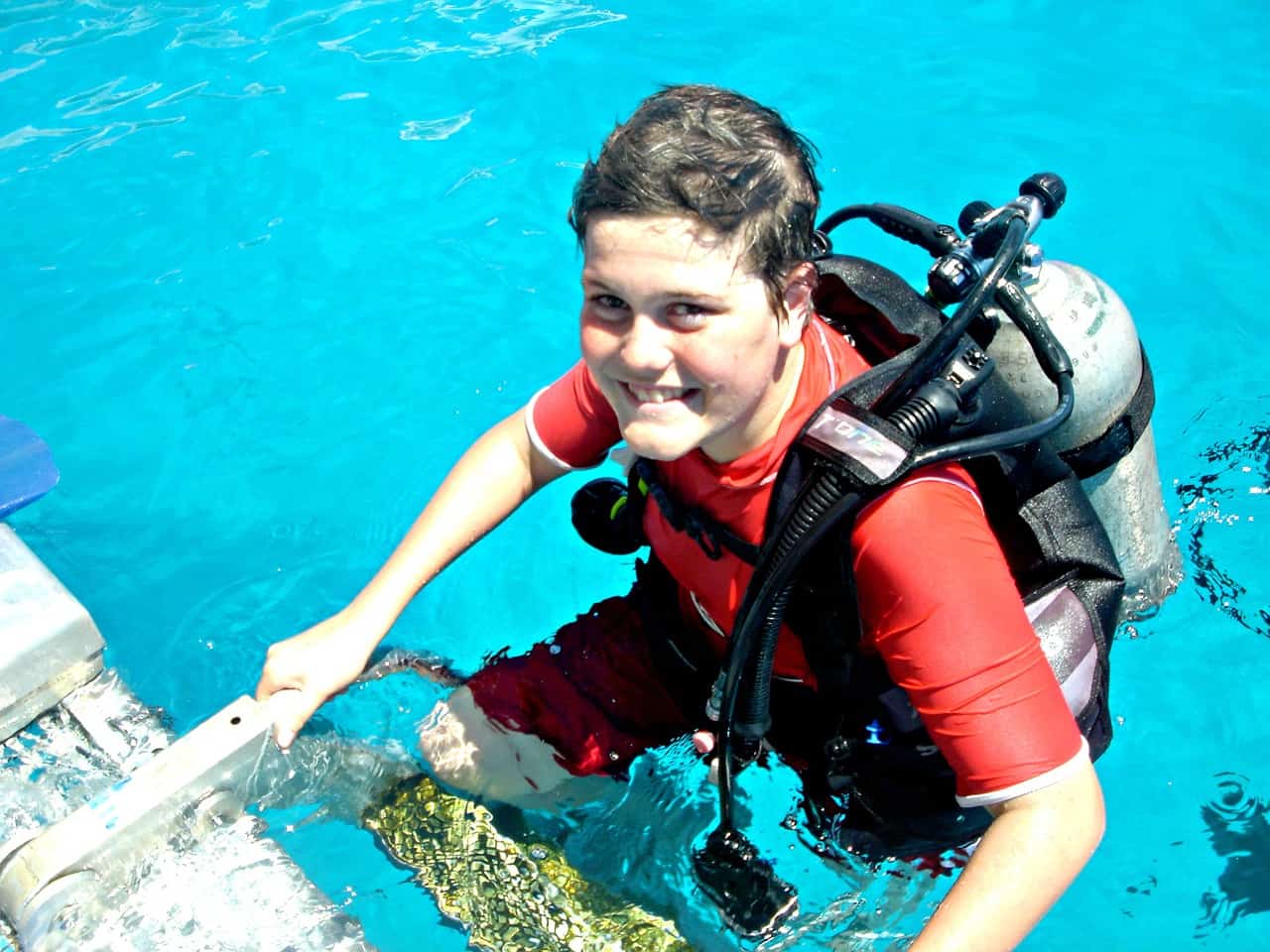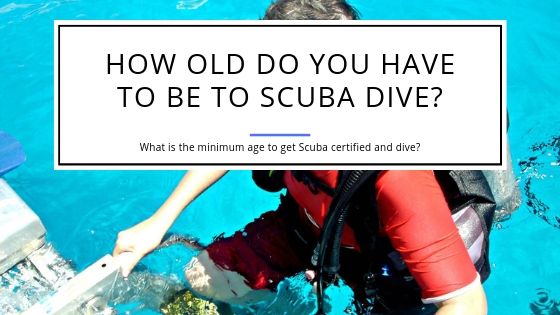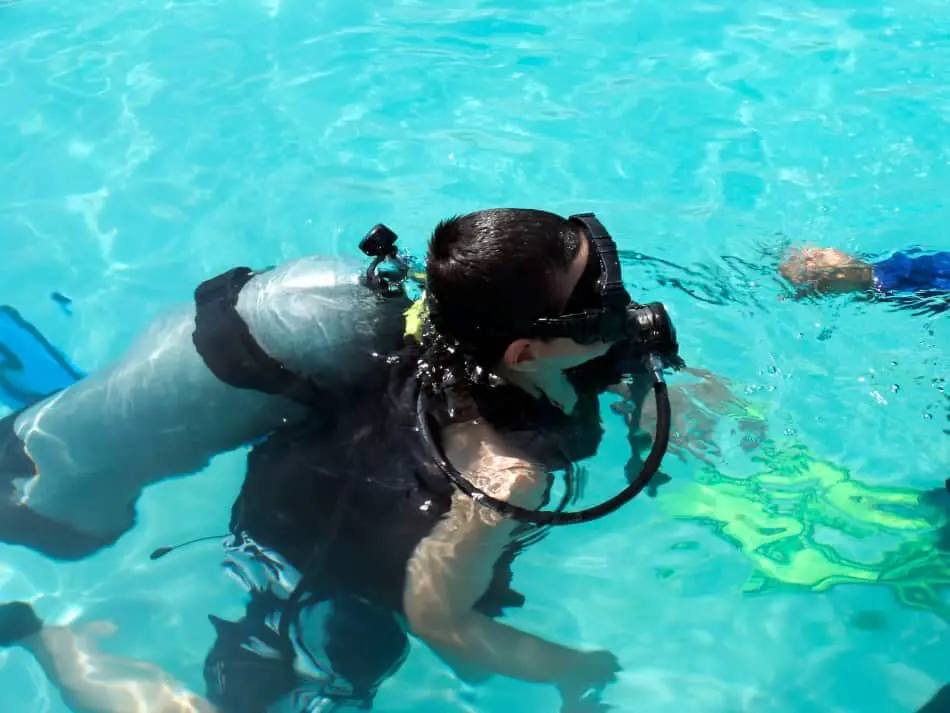How Old Do You Have to Be to Scuba Dive?
Many people believe that the earlier you get your children in the water, the sooner they’ll become more conscientious about their surroundings and eliminate any irrational fears about the water. Most dive institutions start providing scuba diving lessons for children as young as 10 years old.
How old do you have to be to scuba dive? The minimum age to get certified by PADI or SSI is 10 years to get a junior certification. The BSAC requires a kid to be at least 12 years to get certified. There are further restrictions on how deep a kid can dive to ensure their safety and well being.
What is the Minimum Age to Scuba Dive?
Many dive agencies offer scuba diving courses for children as young as eight years old, but these are restricted to confined spaces such as swimming pools. These do not provide certification to dive in open waters such as in the sea or a lake. If you’re not 10 yet, these lessons can be a great way to expose your child to the world of diving. It’s also a fun summer activity.
These courses teach children basic techniques such as equalizing their ears underwater, signaling in case of emergencies, and so on. Important lessons are broken down and simplified to help children understand important elements of scuba diving such as:
- Learning how to clear their scuba mask
- Figuring out how to use a Buoyancy Compensator (BC)
These pools have a maximum depth of around 4 meters (12 feet), and once lessons are over, children are allowed to play around in the water (with adult supervision).
If your children are old enough to enroll in classes for an Open Water Dive Certification but aren’t ready for it yet, they can sign up for these basic classes to get comfortable with the water and their equipment.
How Old Do You Have To Be To Get PADI Certified?
You need to be at least 10 years old to start taking scuba lessons from a PADI instructor. Divers start with the Open Water Diver Certification, and divers less than 15 years old who complete this attain the status of Junior Open Water Diver. These divers are only allowed to dive to a depth of around 12 meters (40 feet) and even then, they need to be accompanied by an adult (in case of emergencies). Even for this junior certification, students use the same material and have the same lessons that are taught to adult divers.
Once divers reach the age of 15, they can dive to 18 meters (around 60 feet) with the same Open Water certification.
Divers taking lessons online need to be at least 13 years old to be taught by a PADI instructor.
For children who are not 10 yet, PADI offers two programs: the Seal Team and the BubbleMaker that are a fun and safe way to introduce children to scuba diving.
What is the Minimum Age to Get SSI Certified?
Just like the requirements for PADI, potential divers need to be at least 10 years old to be taught by an SSI (Scuba Schools International) instructor. Again, similar to PADI, before the age of 15, divers are identified as ‘juniors’ and are upgraded once they reach 15 years of age.
Similar to PADI’s Seal Team and Bubblemaker programs, SSI offers the SSI Scuba Rangers program for younger children.
What is the Age Requirement for BSAC Certification?
MSAC (British Sub-Aqua Club) has stricter requirements than PADI and SSI. Children need to be at least 12 years old to sign up for scuba lessons.
Scuba Diving for 12-14 Year-Olds
12-14 year-olds can obtain junior certifications of adult courses such as the Open Water Diver certification, rescue diver certification, and even some of the more advanced, specialty courses.
The average depth these divers are allowed to descend to is around 60 feet (although some institutions allow divers to go to around 72 feet). All junior divers must be assisted by an adult. Once they reach the age of 15, their certification is automatically upgraded (without any additional testing).
Can You Take Your Kid Scuba Diving if You Are Certified?
Children need to be accompanied by an adult, even if they have an Open Water Diving certification. If you are certified and want to take your child scuba diving, you can do so. Make sure to pay attention to your child and not just focus on your own dive.
Are There Health Risks for Young Kids when Scuba Diving?
There have been no experiments to test the effects of water pressure, decompression sickness, and others on children since they are not only unethical, they are also life-threatening. However, there is plenty of research that indicates that there are certain psychological and physicals risks involved in letting children scuba dive.
Not All Children Are Ready to Dive
Not all children can handle the stress of being underwater. Some core factors need to be considered before you enroll your child in a scuba diving class:
- Does your child actually want to dive?
- Does your child have any mental impairment which may weaken their basic senses and general motor skills underwater?
- Does your child know how to swim (does the child have a latent fear of the water)?
- Does your child have the capability and patience to understand and retain what is being taught in the lesson?
- Can your child fluently read the material provided?
- Does your child have stranger anxiety (or are they comfortable asking strangers for help)?
- Is the child able to apply the rules learned?
Benefits for Children Who Start Diving Early
Although you have to consider your child’s learning capabilities before getting them started on their dive lessons, scuba diving can be a great activity for your children:
- The sooner they start, the more comfortable they’ll be in the water.
- If you’re a diver, you can take your children on tropical scuba diving holidays.
- Scuba diving courses are a great way to develop math and science skills and see them in action in the real world.
- Children who start diving early become more conscious about the impact of their actions on the environment.
- Practicing their diving skills in a challenging environment helps children gain a sense of responsibility.
Medical Impact of Scuba Diving on Children
Certain features about the biological makeup of children make them more susceptible to the risks of scuba diving than adults:
- When you’re born, there is a hole in your heart to allow blood to bypass your lungs. As you grow older, this hole eventually fills up, but while it’s there it makes children more prone to suffer from the side effects of decompression sickness when they dive.
- The Eustachian tube helps adults equalize the air pressure in their ears. These tubes are still in the developmental stage in children meaning that they might find it difficult to equalize air pressure as they descend. This is also why children are more prone to getting ear infections when they spend too much time underwater.

Psychological Impact of Scuba Diving on Children
Apart from affecting a child physically, scuba diving can also be risky for children since their minds are still developing:
- Children may not always understand what is happening to them, so if they experience physical discomfort, they may not realize that it is a sign for them to get out of the water. They will also find it difficult to communicate this feeling to an adult. Experiencing any kind of discomfort underwater can be life-threatening.
- Children can be taught the safety precautions that need to be taken, but they may not necessarily understand when or why to follow them. Memorizing them is not enough: children need to be able to apply them.
- Children may not understand the concept of “safety” too well. They might be laidback about the rules which puts their life at risk.
- If a child is diving with an adult, they may not understand emergency cues or how to react if the fellow adult diver is in trouble.
- If a child starts feeling anxious underwater, they can’t just stop. This isn’t a game of badminton where dropping the racquet is enough. If the child tries to ascend too quickly, they might experience decompression sickness.
Should Children Be Allowed to Scuba Dive?
Although there are a few risks involved for children who take up scuba diving, every child is different. The decision of whether your child scuba dives or not is dependent on his/her mental and physical capabilities, the dive institution and whether or not your child even wants to learn in the first place. If your child loves the water and you feel like they’re ready scuba dive, enroll them in a PADI or SSI course, or any other renowned dive institution in your area.


